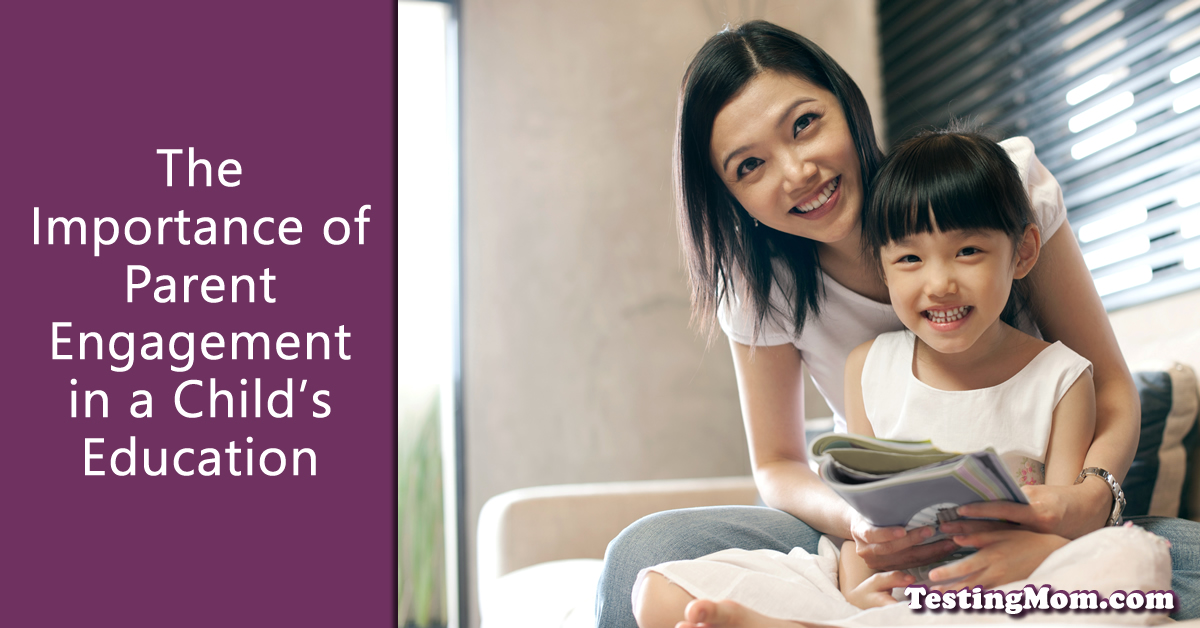› How Important is Parent Engagement in Education Success?
How Important is Parent Engagement in Education Success?
posted by Karen Quinn, The Testing Mom - November 25th, 2019
Children spend 70% of their waking hours (including weekends and holidays) outside of school. As hard as teachers and schools try, you cannot depend on them to give your child all they need when it comes to education. The research for parent engagement is consistent, positive and convincing – The more involved a parent (or other significant family member) is in a child’s education, the higher the odds that the child will be successful in school and in life endeavors. All the research points to this conclusion.

What the Experts Say about Parent Engagement in Education Success
Schools would need to spend $1,000 per pupil to equal parent involvement
$1,000 is the increase in per pupil spending that schools would have to make to achieve same results that are gained with parent involvement. ¹
Kids with involved parents are 52% more likely to get straight A’s
A child is 52% MORE likely to enjoy school and get straight A’s when both parents are involved in the child’s education.²
98% teachers agree that parent involvement equals higher academic achievement
98% of teachers agree that “greater family involvement and support would achieve a strong impact on academic achievement.”³
Children raised in high-language homes have 38-point higher IQs
Children raised in a “high language” household earn 38 more IQ points than children raised in “low language” homes – How much parents speak to their children is more predictive of IQ than socioeconomic status or race.⁴
The size of your home library gives your child a huge educational advantage:
- Growing up in a home with 500 books propels a child 3.2 years further in education, on average, than growing up in a similar home with few or no books.
- A child from a family rich in books is 19 percentage points more likely to complete university than a comparable child growing up without a home library.
- To help your child achieve in school, read, respect book, and pass a love of reading down to your children.⁵
Better grades, higher test scores, graduate and post-graduate education
Regardless of family income and education levels, and from all ethnic and cultural groups, students with involved parents:
- earn higher grades,
- earn higher test scores,
- graduate at higher rates,
- enroll in higher level programs,
- are promoted, pass their classes, earn more credits,
- attend school regularly,
- have better social skills, improved behavior, adapt well to school,
- graduate and go on to post-secondary education.⁶
Many parents wonder, what does parent engagement mean? How can I be most effective when it comes to involvement in my child’s education?
What Does Parent Engagement in Your Child’s Education Mean?
Tips to help you, as a parent, be more engaged:
Start Early and Be Hands-On
- The earlier a parent gets involved in a child’s education, the more powerful the results;
- The most effective form of parental involvement are parents working directly with their children on learning activities at home.
Set High Standards for Your Child
- Research shows that parents of high achieving students set higher standards for their children’s educational achievement than parents of low achieving students.
- What can you do? Set high expectations of your child’s achievement in school from the very beginning!
More Tips for Being Involved in Your Child’s Education
- Show your child that you value hard work, education and accomplishment,
- Work with your child on reading, math and other skills at home,
- Have a home library of books you read to your child and that your child can read,
- Visit local places of interest, and provide educational stimulation through monitored use of online learning sites and apps,
- Carefully monitor after-school activities – limit TV watching, have a place and time for homework activities, arrange for after-school activities and supervised care,
- Establish family routines for homework, chores, family dinner, bedtime, and family activities,
- Encourage lively family discussions at the dinner table,
- Encourage and support your child’s special interests and natural talents,
- Praise your child for hard work, process and effort rather than natural intelligence and being smart; give your child strategies and ideas for becoming more productive in areas that challenge them
- Stay involved in your child’s school – attend conferences, understand the curriculum, volunteer, show up for school activities and events and help your child with homework,
- If you have a sense that your child might have a learning or other issue, you are probably right. Seek out professional help to uncover the problem and solutions.
- Set goals with your child if he is struggling in any subject, monitor his progress, and stay in touch with his teacher to turn around any area of academic challenge; get your child the help he needs via educational psychologists, tutors, on or off-line education programs, or your own daily practice of working together,
Never hesitate to advocate for your child where additional resources or school support is needed academically or socially. Just assume, if you don’t do it, nobody will.
HOT OFF the PRESSES!
We have 1st – 2nd Grade in a Box Flash Cards to challenge your children to expand their math, spatial reasoning, following directions, and general knowledge abilities with four sets of flash cards that develop critical skills for school success and gifted testing.
¹ Research study from University of New Hampshire
² US Dept. of Education
³ Scholastic and Bill & Melinda Gates Foundation
⁴ Study by Drs. Betty Hart and Todd Risley
⁵ Study by M.D.R. Evans, University of Nevada
⁶ A New Wave of Evidence, Southwest Educational Development Laboratory




Tell us about your experiences